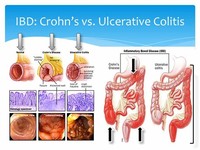Types of ibd

What is Crohn's colitis? Granulomatous colitis, also known as Crohn's colitis, occurs only in the colon (also known as the large intestine or large bowel). It is often just known as Crohn’s colitis and is a form of Crohn’s disease. It accounts for around 20% of Crohn’s disease cases.

Crohn’s disease is a chronic inflammatory condition of the gastrointestinal tract and may affect any part from the mouth to the anus. Read more about the signs and symptoms of Crohn’s disease. Ulcerative colitis is a chronic inflammatory condition limited to the colon, otherwise known as the large intestine.

Gastroduodenal Crohn’s disease is a form of Crohn’s disease that causes inflammation to the oesophagus, stomach and/or duodenum (the first part of the small intestine). This type is not common - only up to around 5% of people with Crohn’s disease have gastroduodenal Crohn’s.

Crohn’s ileitis is a form of Crohn’s disease and causes inflammation in the ileum (the last part of the small intestine). Crohn’s ileitis is thought to account for around 30% of cases of Crohn’s disease.

Ileocolitis is the most common type of Crohn’s disease. It causes inflammation in the end of the small intestine (known as the ileum) and the colon (large intestine) - most often on the right side. Around 50% of people with Crohn’s disease are diagnosed with ileocolitis.

Jejunoileitis is a form of Crohn’s disease which causes inflammation in the jejunum (the upper half of the small intestine). This form of Crohn’s disease is fairly uncommon and is more commonly diagnosed in children than adults.